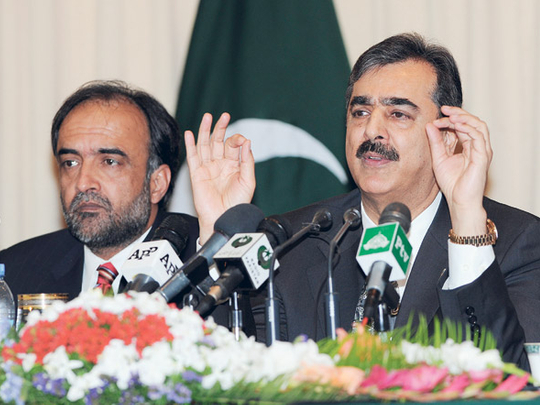
Pakistan's electricity supply problems are putting great pressure on federal and provincial authorities following a series of public protests.
Yesterday, government offices and banks were shut across the country in order to conserve electricity. The government has decided that it is better to observe a two-day weekend, thereby reducing the burden on the power supply.
Additionally, the government has ordered shops to shut earlier, despite the threat of protests from shopkeepers who in the past have angrily resisted such measures.
But the issue is not just about consumers suffering as temperatures soar with the advent of Pakistan's summer. There is also much evidence of the neglect over time of the poorest of the poor by Pakistan's elite. The widespread anger and dismay is a natural outcome of what has been going on for years.
On Thursday, it was left to Prime Minister Yousuf Raza Gilani to appeal for calm and for people to "avoid damaging public property because it serves no one's interest". At the same time, Gilani announced a raft of new measures to conserve electricity, while also increasing power generation so that the gap between supply and demand is reduced.
Complacency
Over the years, Pakistan's elite has increasingly begun to use backup generators, leaving the poor to suffer the consequences of extended power cuts alone. While the lives of people in poorer neighbourhoods have become increasingly difficult, the elite have grown more complacent about their ability to cope.
There are important lessons that should be drawn from Pakistan's mishandling of the electricity crisis. Ordinary Pakistanis are increasingly demanding their fundamental rights in a country where individual rights have long been ignored.
The recent protests have shown that Pakistanis are no longer so apathetic that they will not publicly agitate to demand their rights.
At a time when the country has seen a remarkable increase in the flow of information thanks to the proliferation of privately owned TV channels, it would be naïve to believe that people would continue to be apathetic.
Additionally, the country's increasingly democratic nature also works to encourage voices of dissent in the public place. No matter how imperfect Pakistan's democracy may be, people have gradually become more confident in their ability to stand up for their rights.
As Pakistan deals with this particular challenge, the government needs to improve its ability to enforce the law. But in order to do this, it must also consider the importance of building up its own moral authority.
On the one hand, it is absolutely vital to press ahead with the power conservation plan despite the danger of protests by shopkeepers who appear to have rejected the new steps. Any sign of weakness by the government will only underline the popular view of an administration that lacks the backbone to enforce its policies.
Looking ahead
But on the other hand, it is vital for the government to develop the capacity to appreciate the plight of the poorest of the poor, in ways not considered before. Rather than allowing future crises to develop to the point where it is practically impossible to deal with them in a calm manner, it is vital that these problems be anticipated ahead of time.
This change must come about through the government not just renewing its pledge to work to meet the basic needs of Pakistan's mainstream population, but in fact living up to that promise. An administration that lacks an appreciation of popular needs will only invite popular resentment of the kind seen on the streets of Pakistan in the past few weeks.
It is possible that Pakistan's ruling politicians will eventually be able to extricate themselves from the fallout surrounding the electricity shortage and work towards ensuring stability. But it is also possible that the day will come when discontent becomes so entrenched that Pakistan's ruling elite runs out of luck.
Farhan Bokhari is a Pakistan-based commentator who writes on political and economic matters.










